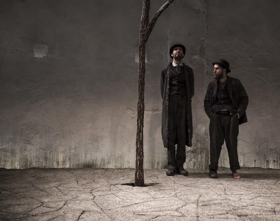Review: Druid's Vivid WAITING FOR GODOT at Shakespeare Theatre Company

It seemed like a clever in-joke when the first lobby announcement at the Shakespeare Theatre Company began, "We appreciate your patience..."
It was opening night for Druid's production of Samuel Beckett's "Waiting for Godot," so of course the whole evening was about patience.
The announcement was about the delay in opening doors to the house, a move that was likely intended to limit the misery of actor Aaron Monaghan. He was already sitting forlornly on a rock as his character Estragon as the audience finally filed in.
Waiting, and musing about the absurdity of waiting, is part of Beckett's celebrated puzzle.
The postwar work, first written in French, is a perfect match for Druid, a 43 year old theatre company from Galway that was the first professional theatre company established outside of Dublin.
Run for all but three years by Garry Hynes, who was the first woman to win a Tony for best director when she brought their production of Martin McDonagh's "The Beauty Queen of Leenane," this is a company with same kind of singular vision that propelled Beckett, an Irishman himself, whose confounding work not only found an audience in the mid-20th century but helped forge a whole new direction for modern theater.
Once inside, a second announcement advised when to take pictures of the set - because the artfully stark and elemental set by Francis O'Connor - with its forlorn tree and singular rock, cracked earth and pocked concrete-like backing - certainly invited them (but not now, when the actor was on stage).
As the lights dimmed and the work began, Monaghan's Estragon, was joined by his lankier friend Vladimir (Marty Rea) also wearing a bowler. The manner of the two mismatched souls - one tall, one short -in tattered clothing (also O'Connor).
Gogo's shoes were so worn they seemed fused to his feet, as he could scarcely pull them off. (When he did, and his foot was half caked in filth, half in sores, and we entered the realm of foot makeup).
The two are waiting for the mysterious Godot (pronounced here with the emphasis on the first syllable) for reasons never explained but endlessly analyzed.
The banter between Gogo and Didi (as Vladimir is called) and their broad mannerisms of course conjure images of comedy teams like Laurel and Hardy whose hat-passing bit is revived here intact, but likely go further back to vaudeville teams like Smith and Dale, Gallagher and Shean, and Weber and Fields.
Instead of emphasizing existential dread, Druid plays up the comedy, which not only makes it more entertaining for an audience but is probably not too far from Beckett's intent. Beckett's one movie screenplay, the 1965 "Film," starred silent comic star Buster Keaton (who had also appeared in the minor 1949 comedy "The Lovable Cheat" in which he waiting for the appearance of a debtor who never arrives, named Godeau).
The rapport between Gogo and Didi, their back-and-forth and repetition, is central to the work - at least until a more menacing team comes on the scene - the hifalutin Pozzo (Rory Nolan), dragging along a slave with a rope around his neck with the preposterous name of Lucky (Garrett Lombard).
They chat with him for a while, and Pozzo throws Gogo his discarded chicken bones before pulling on Lucky's noose to perform.
First comes a clumsy dance, and then a brillianty deranged speech that gets as fast and emphatic as it is nonsensical. The sheer surprise of it draws a burst of audience applause.
By act two, the stark tree has by now been affixed with three leaves, not so much signaling hope as passage of time. Still, the main two are excited that the tree may be strong enough to hold them if they decide to hang themselves.
Their main aim is to wait for Godot. A boy tells them he'd be there the next day, but they can't keep track of what day it is or if they're even at the right place.
The circularity of the play, and the hint that it may be repeated for days to come, if not forever, contrives to create the absurd scenario of hopeless hopefulness that struck a chord in midcentury 20th century just as much as it does today in any number of scenarios big and small.
Your waiting is over; please take your seat. Druid's achievement returns it vividly to life.
Running time: Two hours and 45 minutes, with a 15 minute intermission.
Photo credit: Marty Rea and Aaron Monaghan in Druid's "Waiting for Godot." Photo by Matthew Thompson.
"Waiting for Godot" continues at the Shakespeare Theatre Company's Lansburgh Theatre, 450 7th St. NW, through May 20. Tickets at 202-547-1122 or online.
Reader Reviews

Videos

